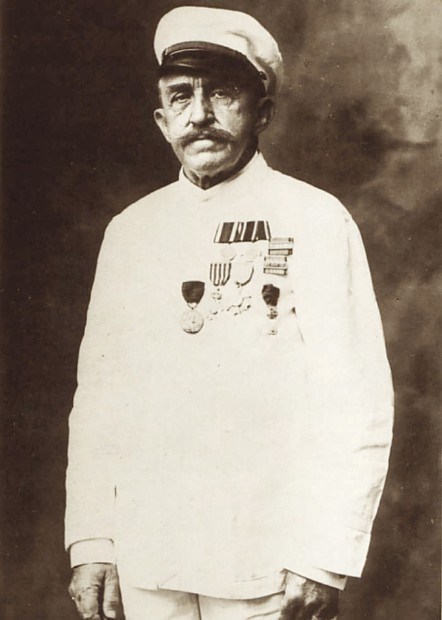Henri Berger (1844-1929), the longest-serving conductor of the Royal Hawaiian Band, visited Kaua‘i with his band several times during his 44-year tenure as Hawai‘i’s bandmaster. On the shore of Hanalei Bay on the morning of March 18, 1874, as the
Henri Berger (1844-1929), the longest-serving conductor of the Royal Hawaiian Band, visited Kaua‘i with his band several times during his 44-year tenure as Hawai‘i’s bandmaster.
On the shore of Hanalei Bay on the morning of March 18, 1874, as the steamer “Kilauea” with King David Kalakaua on board glided slowly toward the Hanalei landing, Berger and the band commenced playing “Hawai‘i Ponoi,” the Kingdom of Hawai‘i’s national anthem and the present Hawai‘i state song.
Suddenly, the band’s music was silenced by a thunderous salute fired from a battery of wooden cannon lined in a row upon the nearby bluff.
Lacking proper iron cannon, the residents of Hanalei had manufactured these improvised wooden cannon by boring thick ohia logs and charging them with gunpowder. When the cannon were fired, they were blown to smithereens.
Shortly thereafter, a good-sized gathering on the beach cheered and children tossed flowers at Kalakaua’s feet as he walked along a path covered with rushes and lined with red and yellow lehua branches.
Sixteen years later, in 1890, when William Hyde Rice superintended the first big fair in Lihu‘e, held on the grounds of his Hale Nani home (located at about the center of today’s Ewalu Street), Kalakaua sent Henri Berger and the Royal Hawaiian band to entertain the fairgoers.
The following year, at noon on July 8, 1891, Rice’s Hale Nani once again came alive with the music of Berger conducting the Royal Hawaiian Band, while 300 to 400 children of various nationalities passed before Queen Lili‘uokalani as she sat on Rice’s lanai.
Later that January, hotel owner W. E. H. Deverill met Lili‘uokalani at his home on Hanalei Bay and noted in his diary that “Her Majesty arrived a little before twelve and so far all has gone nicely. The ball came off fine and lasted till 12 o’clock, when the Royal Band played ‘Hawai‘i Ponoi.’”

Subscribe today for unlimited access.
Already a subscriber?
Login
Not ready to subscribe?
Register for limited access.
If you have a print subscription but require digital access,
activate your account.


